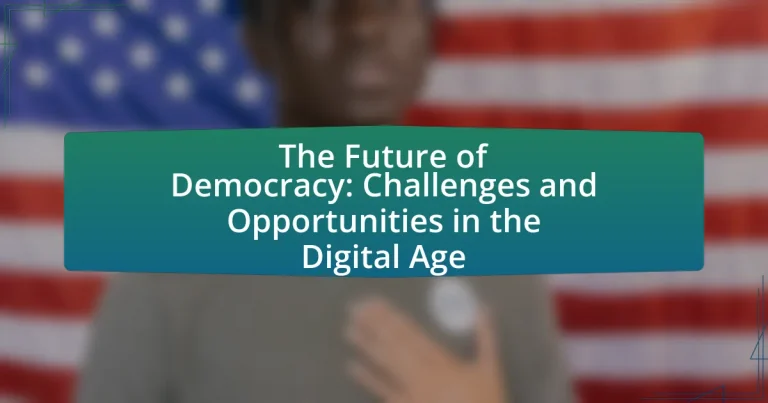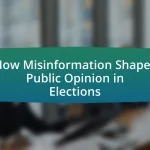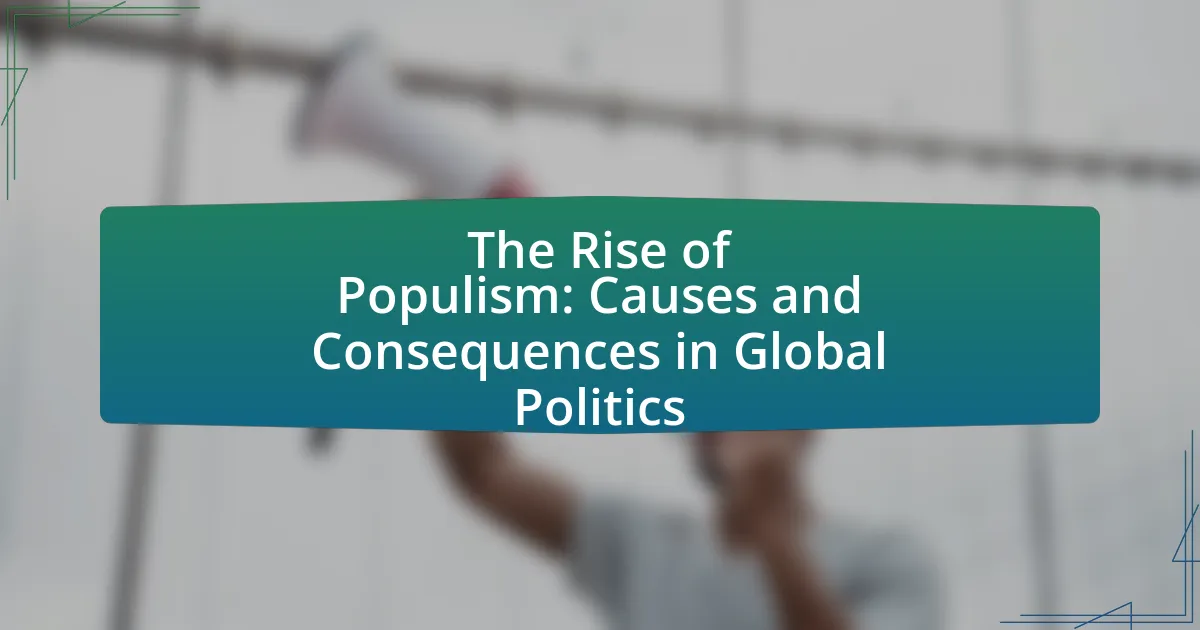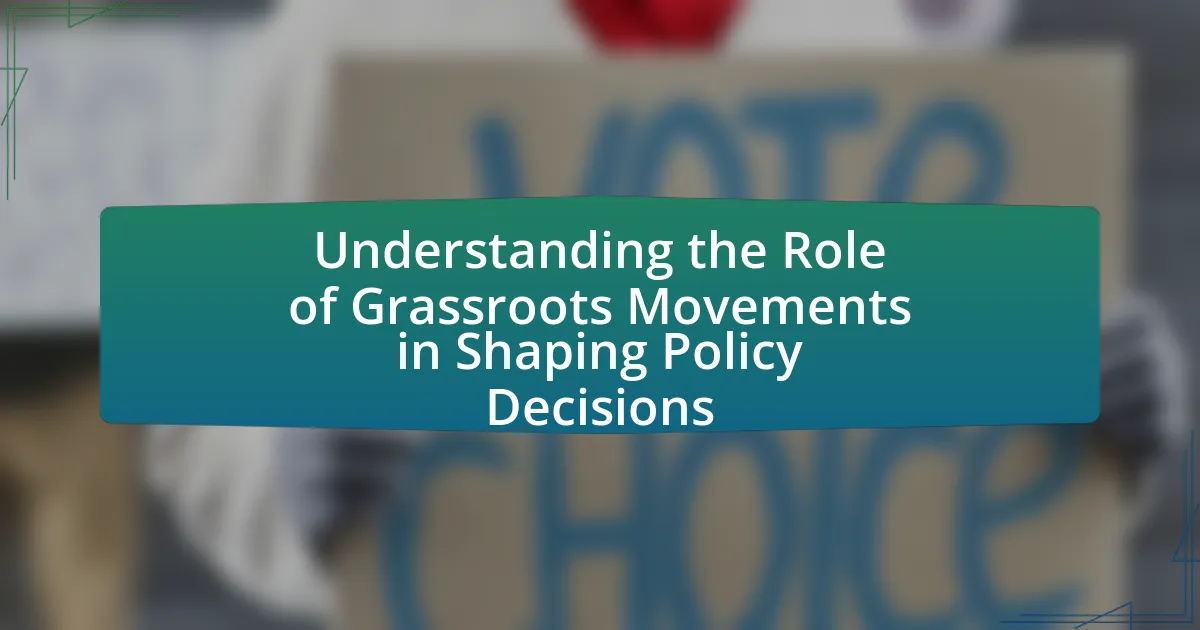The article “The Future of Democracy: Challenges and Opportunities in the Digital Age” examines the critical issues facing democratic systems in the context of digital advancements. Key challenges include the spread of misinformation, erosion of privacy, and the influence of technology on political processes, which collectively threaten democratic integrity. The article also explores the role of social media in disseminating misinformation, the implications of digital surveillance, and the impact of the digital divide on civic engagement. Additionally, it highlights opportunities for enhancing democratic participation through technology, emphasizing the importance of digital literacy and transparency in governance to safeguard democratic values.
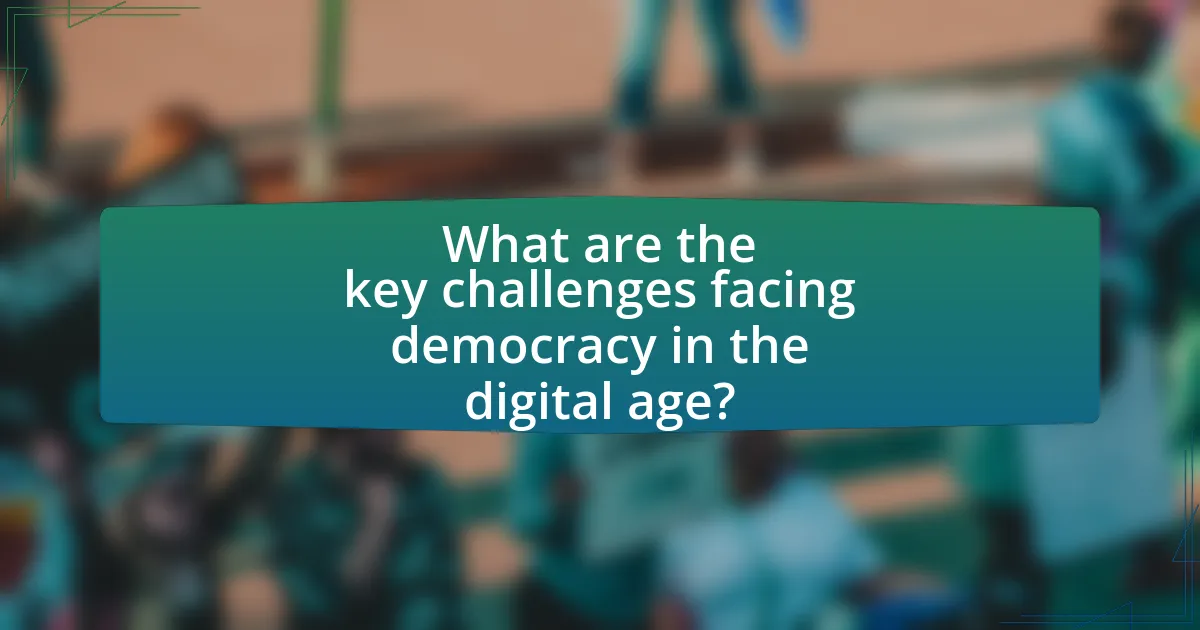
What are the key challenges facing democracy in the digital age?
Key challenges facing democracy in the digital age include misinformation, erosion of privacy, and the influence of technology on political processes. Misinformation undermines informed decision-making, as seen in the spread of false narratives during elections, which can sway public opinion and disrupt democratic processes. Erosion of privacy occurs as personal data is harvested and used for targeted political advertising, raising ethical concerns about manipulation and surveillance. Additionally, the influence of technology, particularly social media algorithms, can create echo chambers that polarize public discourse, making it difficult for diverse viewpoints to coexist. These challenges collectively threaten the integrity and functionality of democratic systems.
How does misinformation impact democratic processes?
Misinformation undermines democratic processes by distorting public perception and influencing voter behavior. It creates confusion and distrust among citizens regarding political candidates, policies, and institutions. For instance, a study by the Pew Research Center found that 64% of Americans believe that misinformation has a significant impact on their ability to make informed decisions during elections. This distortion can lead to polarization, as individuals gravitate towards information that reinforces their existing beliefs, further fragmenting the electorate. Additionally, misinformation can suppress voter turnout by creating apathy or disillusionment with the electoral process, as evidenced by research from the Knight Foundation, which indicates that exposure to false information can decrease civic engagement.
What role do social media platforms play in spreading misinformation?
Social media platforms play a significant role in spreading misinformation by facilitating rapid dissemination of false information to large audiences. Their algorithms prioritize engagement over accuracy, often amplifying sensational or misleading content, which can lead to widespread belief in false narratives. For instance, a study published in the journal Science found that false news stories are 70% more likely to be retweeted than true stories, highlighting the platforms’ impact on the spread of misinformation. Additionally, the lack of stringent fact-checking mechanisms allows misleading information to proliferate unchecked, further complicating the public’s ability to discern truth from falsehood.
How can misinformation undermine public trust in democratic institutions?
Misinformation can significantly undermine public trust in democratic institutions by creating confusion and skepticism about their legitimacy and effectiveness. When citizens encounter false information regarding electoral processes, government actions, or public policies, it can lead to a perception that these institutions are untrustworthy or corrupt. For instance, studies have shown that exposure to misinformation can decrease voter turnout and increase polarization, as individuals become disillusioned with the political system. According to a 2020 report by the Pew Research Center, 64% of Americans believe that misinformation has a major impact on public confidence in elections. This erosion of trust can destabilize democratic processes and hinder civic engagement, ultimately threatening the foundation of democracy itself.
What are the implications of digital surveillance on democracy?
Digital surveillance poses significant threats to democracy by undermining privacy, eroding trust in institutions, and facilitating authoritarian practices. The pervasive collection of personal data can lead to self-censorship among citizens, as individuals may alter their behavior due to the fear of being monitored. Studies, such as those conducted by the Electronic Frontier Foundation, indicate that increased surveillance correlates with a decline in civic engagement and public discourse. Furthermore, governments may exploit surveillance technologies to suppress dissent and manipulate public opinion, as seen in various authoritarian regimes that utilize digital tools to monitor and control their populations. These implications highlight the urgent need for robust legal frameworks to protect democratic values in the face of advancing surveillance technologies.
How does government surveillance affect citizen privacy and freedom of expression?
Government surveillance significantly undermines citizen privacy and freedom of expression by creating an environment of constant monitoring and potential repercussions for dissent. When governments collect data on individuals, it can lead to self-censorship, as citizens may refrain from expressing their opinions or engaging in activism due to fear of surveillance. For instance, a report by the Electronic Frontier Foundation highlights that in countries with extensive surveillance programs, such as China, individuals are less likely to speak out against the government, fearing repercussions. This chilling effect on free speech is further supported by studies indicating that knowledge of surveillance can alter behavior, leading to a decrease in public discourse and a less vibrant democratic society.
What are the risks of data misuse in political campaigns?
The risks of data misuse in political campaigns include voter manipulation, privacy violations, and the spread of misinformation. Voter manipulation occurs when campaigns use personal data to target individuals with tailored messages that may distort their perceptions or influence their voting behavior. Privacy violations arise when sensitive personal information is collected without consent, leading to potential breaches of trust and legal repercussions. The spread of misinformation can be exacerbated by data misuse, as campaigns may exploit social media algorithms to disseminate false narratives, undermining the integrity of the electoral process. For instance, the Cambridge Analytica scandal highlighted how data from millions of Facebook users was improperly used to influence voter behavior in the 2016 U.S. presidential election, illustrating the significant impact of data misuse on democratic processes.
How does the digital divide affect democratic participation?
The digital divide significantly hinders democratic participation by creating unequal access to information and communication technologies. Individuals without reliable internet access or digital literacy are less able to engage in political discourse, access governmental resources, or participate in online voting and activism. According to a 2021 report by the Pew Research Center, approximately 30% of Americans in lower-income households lack high-speed internet, which limits their ability to engage in civic activities that increasingly occur online. This disparity can lead to underrepresentation of marginalized groups in democratic processes, ultimately weakening the overall democratic framework.
What groups are most affected by the digital divide?
Low-income individuals, rural communities, the elderly, and racial and ethnic minorities are the groups most affected by the digital divide. These populations often lack access to reliable internet and digital devices, which hinders their ability to participate in online education, job opportunities, and civic engagement. For instance, according to the Pew Research Center, 25% of adults in households earning less than $30,000 annually do not have home broadband, compared to only 2% of those earning $75,000 or more. Additionally, rural areas face significant infrastructure challenges, with 14% of rural Americans lacking access to high-speed internet, as reported by the Federal Communications Commission. This disparity in access exacerbates existing inequalities and limits opportunities for these vulnerable groups in the digital age.
How can bridging the digital divide enhance democratic engagement?
Bridging the digital divide enhances democratic engagement by ensuring equitable access to information and participation in the democratic process. When all individuals have access to digital tools and the internet, they can engage in political discussions, access government services, and participate in elections more effectively. For instance, a study by the Pew Research Center found that internet users are more likely to engage in civic activities, such as voting and contacting elected officials, compared to non-users. This increased access fosters a more informed electorate, leading to higher voter turnout and greater accountability from elected officials.
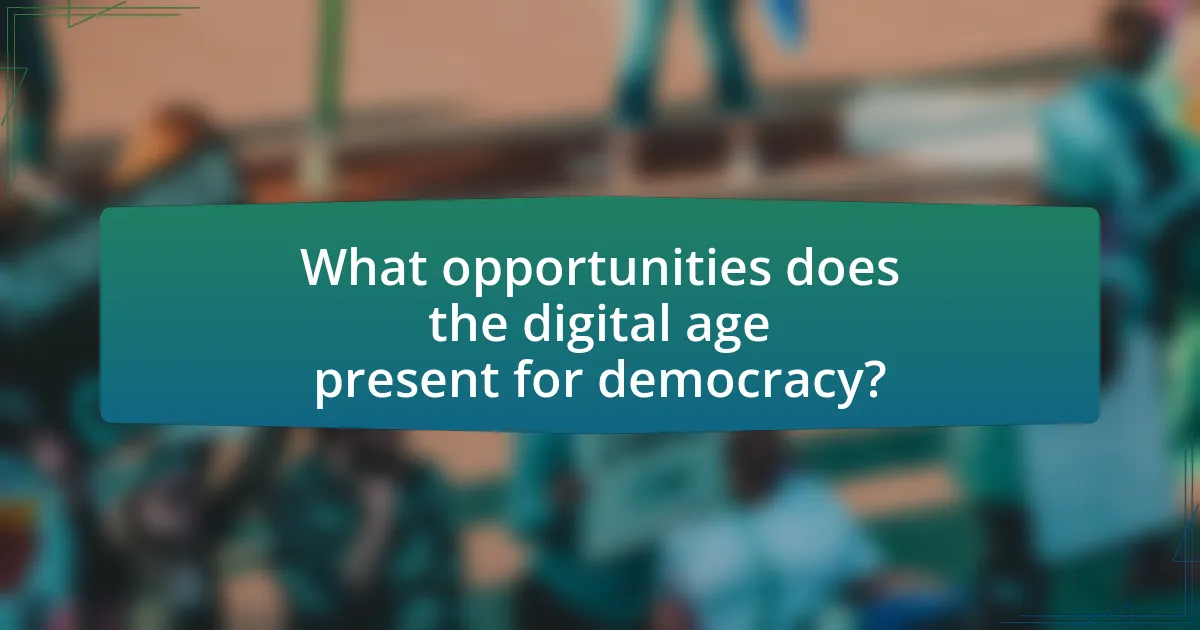
What opportunities does the digital age present for democracy?
The digital age presents significant opportunities for democracy by enhancing citizen engagement and facilitating access to information. Digital platforms enable broader participation in political processes, allowing citizens to voice their opinions and mobilize for causes through social media and online petitions. For instance, the Arab Spring demonstrated how social media could organize protests and promote democratic movements. Additionally, technology allows for greater transparency in governance, as citizens can access government data and hold officials accountable, exemplified by initiatives like open data portals in various countries. These advancements contribute to a more informed electorate and foster a culture of active participation in democratic processes.
How can technology enhance voter participation?
Technology can enhance voter participation by providing accessible platforms for registration, information dissemination, and voting. Online voter registration systems simplify the process, allowing individuals to register from home, which has been shown to increase participation rates; for instance, states that implemented online registration saw a 10% increase in voter turnout. Additionally, mobile applications and websites can deliver real-time information about candidates and issues, helping voters make informed decisions. Furthermore, technology enables remote voting options, such as mail-in ballots and secure online voting, which can significantly increase participation, especially among those with mobility challenges or those living abroad. Studies indicate that jurisdictions offering these options often experience higher voter engagement, demonstrating the positive impact of technology on democratic participation.
What are the benefits of online voting systems?
Online voting systems offer increased accessibility, allowing voters to participate from any location with internet access. This convenience can lead to higher voter turnout, as evidenced by a study from the Pew Research Center, which found that online voting can reduce barriers for individuals with disabilities and those living in remote areas. Additionally, online voting systems can enhance the efficiency of the electoral process by streamlining vote collection and counting, reducing the time and resources needed for traditional voting methods. Security measures, such as encryption and secure authentication, can also be implemented to protect voter data and ensure the integrity of the election, as demonstrated by successful implementations in countries like Estonia, where online voting has been used since 2005 with positive results.
How can digital platforms facilitate civic engagement and activism?
Digital platforms facilitate civic engagement and activism by providing accessible channels for communication, organization, and mobilization. These platforms enable individuals and groups to share information rapidly, organize events, and rally support for causes, significantly increasing participation in democratic processes. For instance, social media platforms like Twitter and Facebook have been instrumental in movements such as the Arab Spring, where they allowed activists to coordinate protests and disseminate information to a global audience. Additionally, research from the Pew Research Center indicates that 69% of adults in the U.S. believe social media is an effective tool for raising awareness about social issues, demonstrating its role in enhancing civic participation.
What role does social media play in modern democratic movements?
Social media serves as a crucial tool in modern democratic movements by facilitating communication, organization, and mobilization among activists and supporters. It allows for rapid dissemination of information, enabling movements to reach a global audience and garner support quickly. For instance, during the Arab Spring, platforms like Twitter and Facebook were instrumental in organizing protests and sharing real-time updates, which significantly contributed to the movements’ visibility and impact. Research by the Pew Research Center indicates that 69% of adults in the U.S. use social media, highlighting its pervasive role in shaping public discourse and political engagement. Thus, social media not only amplifies voices but also fosters community and solidarity among individuals advocating for democratic change.
How have social media campaigns influenced recent elections?
Social media campaigns have significantly influenced recent elections by shaping public opinion and voter engagement. For instance, during the 2020 U.S. presidential election, platforms like Facebook and Twitter were utilized to disseminate targeted advertisements and mobilize supporters, resulting in a record voter turnout of 159 million, the highest in U.S. history. Research from the Pew Research Center indicates that 53% of voters reported that social media played a crucial role in their decision-making process. Additionally, social media campaigns have facilitated the rapid spread of information, both positive and negative, impacting candidates’ public images and electoral outcomes.
What are the potential risks and rewards of using social media for political mobilization?
Using social media for political mobilization presents both significant risks and rewards. The rewards include increased engagement and outreach, as social media platforms can rapidly disseminate information to a wide audience, facilitating grassroots movements and enabling marginalized voices to be heard. For instance, the Arab Spring demonstrated how social media could mobilize protests and organize collective action effectively.
Conversely, the risks involve the spread of misinformation and polarization, as social media can amplify false narratives and create echo chambers that reinforce divisive views. Research by the Pew Research Center indicates that misinformation on social media can significantly influence public opinion and voter behavior, potentially undermining democratic processes. Additionally, the potential for surveillance and data privacy concerns poses threats to individual freedoms and the integrity of political discourse.
How can technology improve transparency in governance?
Technology can improve transparency in governance by enabling real-time access to information and facilitating open communication between government entities and citizens. Digital platforms, such as e-governance portals and mobile applications, allow citizens to track government spending, access public records, and participate in decision-making processes. For instance, the implementation of blockchain technology in public records can ensure data integrity and prevent tampering, thereby enhancing trust in governmental operations. According to a study by the World Bank, countries that adopted digital governance initiatives saw a significant increase in citizen engagement and satisfaction, demonstrating that technology can effectively bridge the gap between governments and the public.
What tools are available for citizens to hold governments accountable?
Citizens can hold governments accountable through various tools such as transparency initiatives, public petitions, social media platforms, and watchdog organizations. Transparency initiatives, like open data portals, allow citizens to access government information, fostering accountability. Public petitions enable citizens to express their demands and influence policy decisions, as seen in movements that have successfully changed legislation. Social media platforms serve as powerful tools for mobilizing public opinion and exposing government actions, exemplified by movements like the Arab Spring. Watchdog organizations, such as Transparency International, monitor government activities and report on corruption, providing citizens with the information needed to demand accountability. These tools collectively empower citizens to engage with and influence their governments effectively.
How does open data contribute to a more informed electorate?
Open data contributes to a more informed electorate by providing accessible information that enhances transparency and accountability in governance. When citizens can access data on government spending, policy outcomes, and electoral processes, they are better equipped to evaluate the performance of their representatives and make informed voting decisions. For instance, studies have shown that open data initiatives can lead to increased civic engagement, as evidenced by the 2013 Open Government Partnership report, which highlighted that countries with open data policies saw a 20% increase in public participation in governance. This access to information empowers voters to hold officials accountable and fosters a more engaged and knowledgeable citizenry.
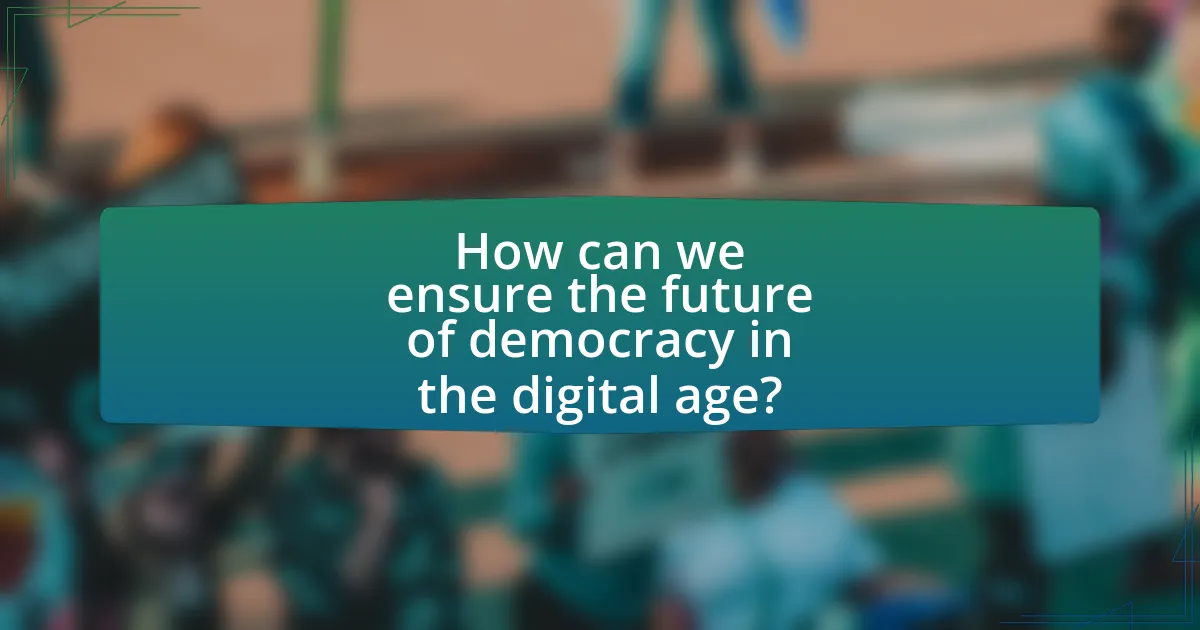
How can we ensure the future of democracy in the digital age?
To ensure the future of democracy in the digital age, it is essential to implement robust digital literacy programs that educate citizens about online information, critical thinking, and the implications of digital platforms on democratic processes. Research indicates that misinformation and disinformation campaigns can significantly undermine democratic institutions; for instance, a study by the Pew Research Center found that 64% of Americans believe fabricated news stories cause confusion about the basic facts of current events. Additionally, enhancing transparency in algorithms used by social media platforms can help mitigate bias and promote fair representation of diverse viewpoints. By fostering an informed electorate and ensuring accountability in digital spaces, democracy can be safeguarded against the challenges posed by the digital landscape.
What policies can mitigate the challenges of digital democracy?
Policies that can mitigate the challenges of digital democracy include implementing robust data privacy regulations, enhancing digital literacy programs, and promoting transparency in algorithmic decision-making. Data privacy regulations, such as the General Data Protection Regulation (GDPR) in the European Union, protect citizens’ personal information and foster trust in digital platforms. Enhancing digital literacy equips citizens with the skills to critically evaluate online information, reducing the impact of misinformation and disinformation. Promoting transparency in algorithmic decision-making ensures that citizens understand how their data is used and how decisions are made, which can help address biases and increase accountability in digital governance.
How can governments regulate social media to protect democratic integrity?
Governments can regulate social media to protect democratic integrity by implementing laws that ensure transparency, accountability, and the prevention of misinformation. For instance, regulations can require social media platforms to disclose the sources of funding for political advertisements, thereby increasing transparency in political messaging. Additionally, governments can mandate that platforms develop algorithms to identify and limit the spread of false information, which has been shown to undermine public trust in democratic processes. Research from the Pew Research Center indicates that 64% of Americans believe that social media has a mostly negative effect on the way things are going in the country, highlighting the need for effective regulation to safeguard democratic values.
What role do educational initiatives play in promoting digital literacy?
Educational initiatives are crucial in promoting digital literacy by providing structured learning environments that equip individuals with essential skills to navigate the digital landscape. These initiatives, such as school curricula, community workshops, and online courses, focus on teaching critical thinking, information evaluation, and technical skills necessary for effective digital engagement. For instance, a report by the International Society for Technology in Education highlights that students who participate in digital literacy programs demonstrate improved ability to discern credible information online, which is vital for informed citizenship in a democratic society.
What best practices can enhance democratic engagement online?
Best practices that can enhance democratic engagement online include fostering transparency, encouraging diverse participation, and utilizing technology for outreach. Transparency in online platforms allows citizens to access information about governmental processes and decisions, which builds trust and accountability. Encouraging diverse participation ensures that various voices, particularly marginalized groups, are included in discussions, leading to more representative outcomes. Utilizing technology, such as social media and online forums, can facilitate outreach and mobilization, as evidenced by the significant role these platforms played in movements like the Arab Spring, where digital tools were crucial for organizing and raising awareness.
How can organizations foster inclusive digital participation?
Organizations can foster inclusive digital participation by implementing accessible technologies and promoting digital literacy among diverse populations. By ensuring that digital platforms are designed with accessibility features, such as screen readers and easy navigation, organizations can remove barriers for individuals with disabilities. Furthermore, providing training programs that enhance digital skills can empower underrepresented groups, enabling them to engage fully in online democratic processes. Research indicates that inclusive digital participation leads to more equitable representation and decision-making, as seen in studies highlighting increased voter turnout among marginalized communities when digital tools are made accessible.
What strategies can be employed to combat misinformation effectively?
To combat misinformation effectively, strategies such as promoting media literacy, implementing fact-checking initiatives, and enhancing transparency in information sources can be employed. Media literacy programs educate individuals on how to critically evaluate information, which is essential in an era where misinformation spreads rapidly. For instance, studies show that media literacy can significantly reduce the likelihood of individuals believing false information. Fact-checking initiatives, such as those conducted by organizations like Snopes and FactCheck.org, provide verified information that counters false claims, thereby helping to clarify misconceptions. Additionally, enhancing transparency in information sources, such as requiring social media platforms to disclose the origins of shared content, can help users assess the credibility of the information they encounter. These strategies collectively contribute to a more informed public, which is crucial for the health of democracy in the digital age.
What are the key takeaways for citizens to navigate democracy in the digital age?
Citizens can navigate democracy in the digital age by actively engaging with digital platforms, critically evaluating information, and participating in online civic activities. Engaging with digital platforms allows citizens to access diverse viewpoints and participate in discussions that shape public opinion. Critical evaluation of information is essential, as misinformation can spread rapidly online; citizens should verify sources and cross-check facts before sharing content. Participation in online civic activities, such as virtual town halls or digital petitions, empowers citizens to influence decision-making processes. According to a 2021 Pew Research Center study, 53% of Americans reported using social media to engage with political content, highlighting the importance of digital engagement in contemporary democracy.
